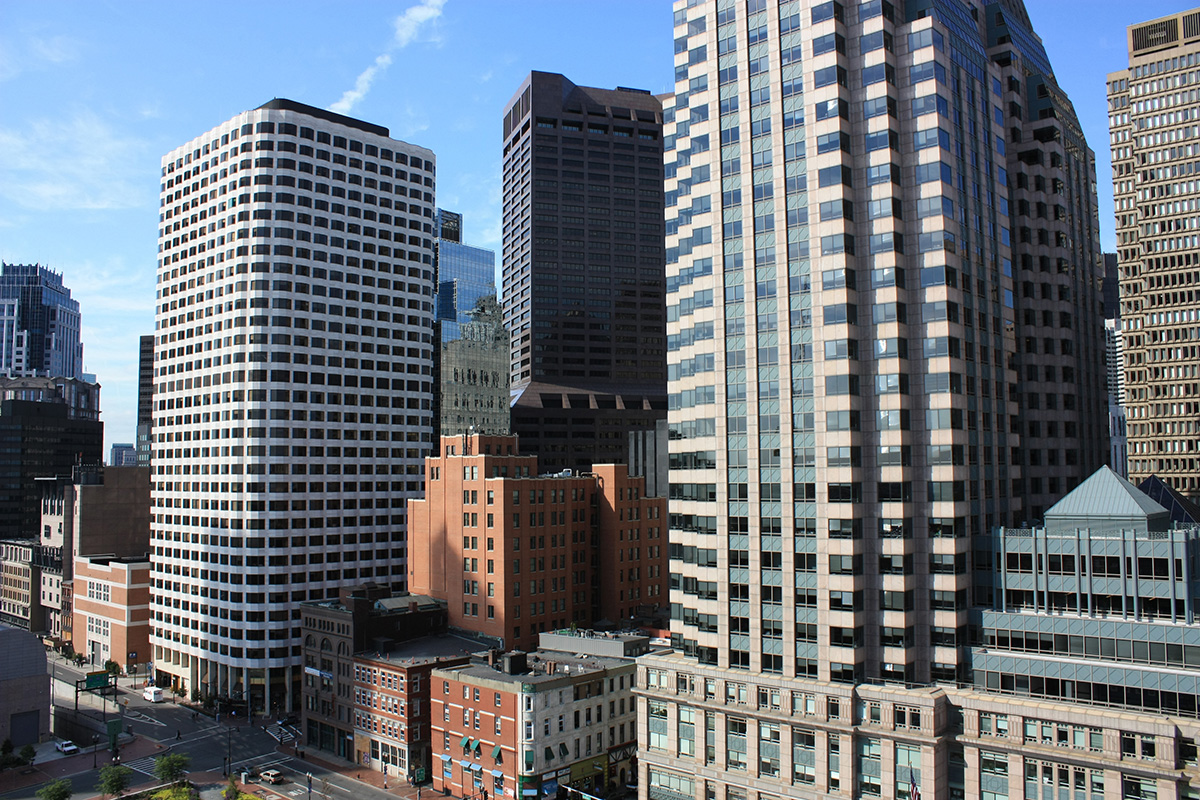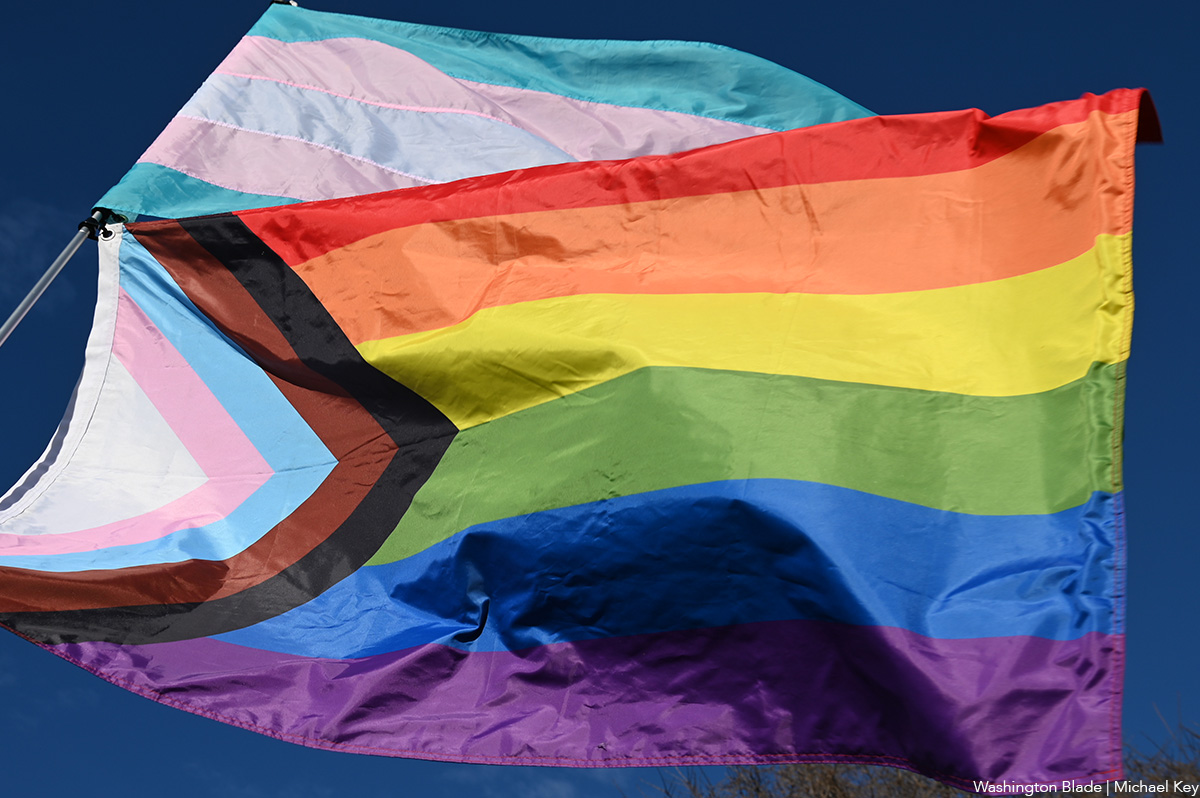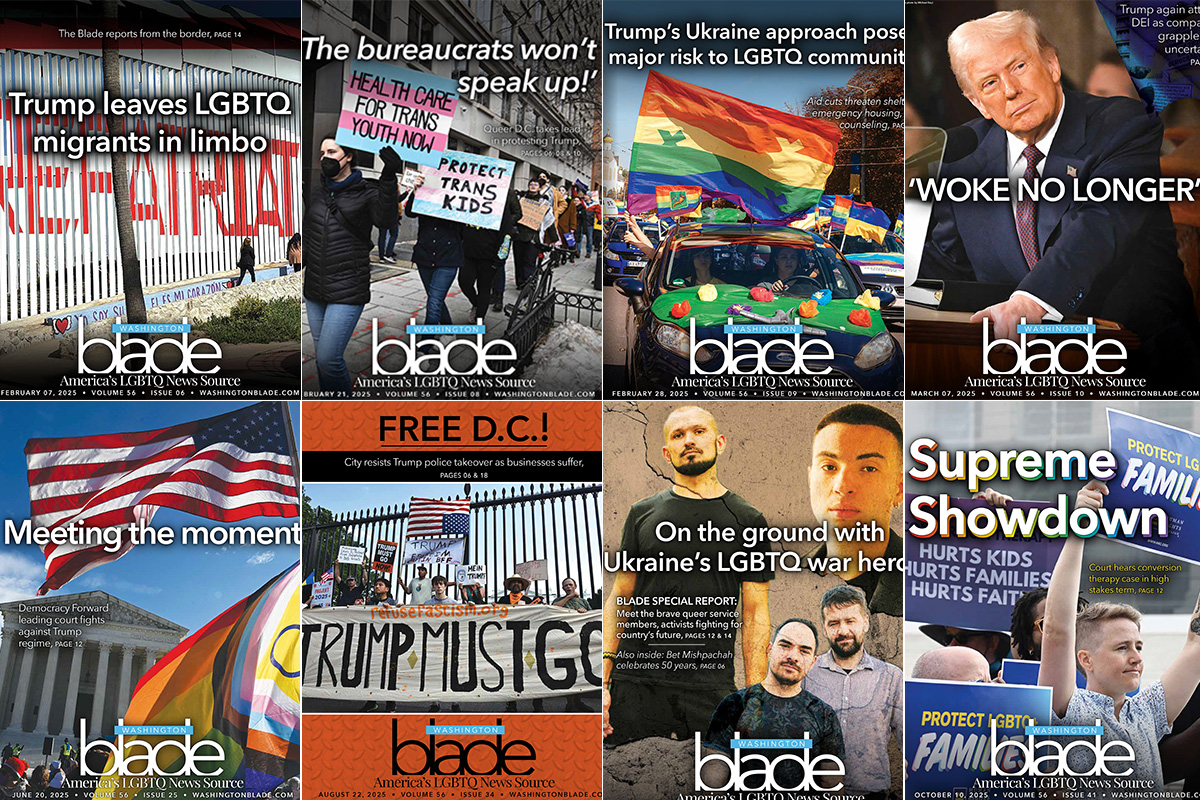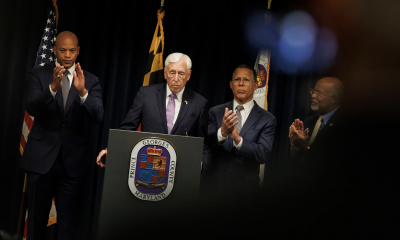Opinions
Boston sanctuary designation must be backed by policy changes
A symbolic but important step for transgender protections

The city of Boston’s recent decision to give Sanctuary City status for the transgender community, while largely symbolic, is critically important. Following in the footsteps of Northampton, Worcester, Cambridge, and Pittsfield, it represents a local government’s commitment to standing with and protecting the transgender community. This is especially vital in a time when transgender individuals face increasing threats to their safety.
The number of trans people murdered in the U.S. nearly doubled between 2017 and 2021, a rise that coincided with increased anti-trans rhetoric and policies, particularly during the Trump administration.
Specifically, Black trans women have been disproportionately affected. While Black individuals make up less than one-fifth of the transgender population, they account for nearly three-quarters of known victims of anti-trans violence. Given this reality, a sanctuary designation should signal a meaningful commitment to protecting transgender residents, including addressing systemic issues within law enforcement.
Historically, both the LGBTQIA+ and Black communities have experienced harm at the hands of police. If a sanctuary designation is to be more than just a statement, it must come with actionable steps toward safety, justice, and rebuilding trust. Whether the trans community is widely aware of these votes in Boston and these other communities varies, but for those who are, such designations can provide a sense of validation, security, and hope — especially if they are backed by real policy changes.
While only a handful of cities across the U.S. have declared themselves transgender sanctuary cities, this is a movement that needs to grow. As a provider working with transgender individuals, I see firsthand the fear and uncertainty many face—simply for existing or for trying to access basic healthcare.
There have already been discussions about criminalizing providers who support transgender youth, and we have seen violent threats, including the bomb threats at Boston’s youth gender clinic a few years ago.
These designations send a strong message: that a city stands with trans individuals and the people who support them. They signal that local governments will not comply with oppressive, transphobic policies.
With Donald Trump openly advocating for a society that erases trans identities, it is crucial for cities to take a stand. Historically, civil rights movements—whether for women’s suffrage, Black rights, or LGBTQ+ rights — have only succeeded because enough people pushed back. Progress does not happen without resistance.
If more cities like Boston, step up and take these actions, it could create a powerful network of resistance that makes a real difference. Transgender individuals and their allies need to know that there are places where they will be protected, and these policies are a step toward ensuring that safety.
Predictably, the designation has prompted an outcry and recycled attacks that have been used against the queer community for decades. For example, the false narratives that LGBTQ+ people, particularly trans individuals, are pedophiles or predators or that gay men are inherently dangerous to children. The latter assumption was reinforced by scandals involving priests who abused young boys. Many people wrongly assumed that being a gay priest equated to being a child predator.
This same fear-mongering has since been weaponized against drag queens, particularly those who host story hours, and now it is being used to target transgender individuals.
While there have been isolated cases of people from any demographic committing heinous acts, it is entirely baseless to generalize an entire group based on the actions of a few.
The reality is that, according to data from the Administrative Office of the U.S. Courts, 95.5% of convicted pedophiles are men, and more than half are white. Given that transgender individuals make up about one percent of the U.S. population, most convicted pedophiles are not transgender.
Another key issue is the widespread misconception that transgender people already have equal rights. Many people assume that basic rights—like housing, employment, and healthcare—are equally accessible to all.
In reality, transgender individuals can still be legally denied housing, jobs, and medical care in many states. Queer people, in general, often face legal barriers to adoption, and while same-sex marriage was only recently legalized, it is now under political threat, with discussions about giving states the power to overturn it.
So the claim that transgender people have equal rights—especially compared to cisgender, straight white people—is not just misleading; it’s entirely false.
Will Dempsey, LICSW, is founder of Heads Held High Counseling, a social worker, drag queen and queer rights advocate. Heads Held High Counseling is a LGBTQIA+ virtual group therapy practice supporting queer and trans individuals across Massachusetts and Illinois.
Opinions
Team Rayceen’s hiatus is officially over
Reflecting on a dark year while looking forward to 2026

In 2026, many will analyze the last 12 years because Mayor Bowser’s administration will conclude at the end of her current third term. My focus on this time frame is that as of 2026, Team Rayceen Productions will have existed for a dozen years. We have been through six primary elections, five pivotal production faux pas, four personnel problems, three presidents, two presidential impeachments, and a pandemic — and we’re still here.
Although our mantra is that we are For the People, TRP (Team Rayceen Productions) is essentially a one-man band. While Rayceen Pendarvis is a renowned emcee and revered community leader, and TRP has talented co-hosts and cherished volunteers, administratively and creatively, from invoices and graphics to selecting guests for interviews or performers for events, I run the show. This can be daunting, as it is for the numerous volunteers and staff members with many community groups and local LGBTQ organizations that take on multiple responsibilities while struggling with limited funding, resources, and institutional support.
After my sense of disappointment (but not shock or surprise) at the results of the 2024 presidential election, I abandoned my dreams and plans for TRP under a Harris administration and activated Plan B: stepping back from my creative duties and letting the annual TRP winter hiatus continue indefinitely. I correctly predicted that events would be cancelled, funding would become unavailable, and that overall, 2025 would be bleak.
Halting work on the Team Rayceen YouTube channel caused me to realize that this one aspect of my responsibilities was essentially an unpaid full-time job, especially during election years, due to our numerous candidate interviews. I was producer, director, editor, and booking agent; I did everything except interview guests on camera. Those five years of creating videos and live streams were exhausting. With that not happening, I had the unfamiliar experience of having free time in 2025. Within 10 months, I read more books than I had in the past 10 years.
Throughout the year, I continued my duties not only as TRP administrator and archivist, I also remained Rayceen’s de facto manager, agent, publicist, and speechwriter. By summer, somewhat reluctantly, I had resumed some of my TRP creative duties when collaborations with Arena Stage were offered. In the autumn, TRP also returned for Art All Night Shaw and organized an LGBTQ town hall.
Moving forward, I have decided to recalibrate my TRP roles. Our hiatus is officially over, and now we are prioritizing collaborations and supporting other organizations. I am calling it the Team Rayceen Agenda for Community Engagement, the acronym being T.R.A.C.E., our outline of priorities for the New Year.
These are our current priorities within the LGBTQ community:
• Increasing and improving communication and collaboration among LGBTQ organizations and groups, including those that are new and smaller
• Honoring LGBTQ elders
• Increasing and strengthening intergenerational bonds among LGBTQ people
• Welcoming and engaging with local LGBTQ community members who are new to their identities, the geographic region, or adulthood
• Creating databases for booking local LGBTQ performers, DJs, and photographers
We hope to partner with an array of organizations for these agenda items:
• Increasing voter registration, education, and participation
• Informing voters about the candidates, as well as proposed legislation and ballot measures, including via community listening sessions and candidate debates, forums, and interviews
• Creating events that are inclusive and foster LGBTQ allyship and finding ways to cultivate allyship, with an emphasis on trans people
• Organizing efforts to unify various demographic groups, including Black and API communities, and creating opportunities to dialogue, socialize, and collaborate
• Creating new local awards that honor and acknowledge elders, young people, performers, content creators, and event organizers
My advocacy for Rayceen Pendarvis will also continue:
• More hosting and emcee bookings
• Acting roles and cameo appearances in films, TV series, web series, commercials, and music videos
• Music recording opportunities as a featured or backing vocalist
(If interested in anything listed above, please email us.)
I have hope that these things are achievable and that if we can bring the right people together, action could happen soon. I think people in the region are ready for change: not only is The National LGBTQ Task Force’s Creating Change Conference in D.C. this year, but the board of Capital Pride Alliance (CPA) has new leadership; capable people have become staff members at CPA, the Mayor’s Office of LGBTQ Affairs, and elsewhere; and qualified people are running for positions to lead or represent D.C. residents, in races that are open or competitive.
For those reasons, I feel that perhaps D.C., including its LGBTQ community, is not going to be a kakistocracy, plutocracy, oligarchy, and/or gerontocracy. I am less certain about the federal government. We shall see how much beyond 12 years TRP lasts and how much beyond 250 years the USA lasts, if indeed, during this fascist regime, the latter currently exists in any meaningful way.
I’ve been through nearly 12 years of Team Rayceen Productions. This includes organizing numerous special events, such as two Black History Month programs and two town hall discussions. We convened three online At-Large Councilmember Candidate Forums in 2020. We produced Rayceen’s Reading Room for D.C. Public Library for four consecutive years. We produced four variety shows for Artomatic. We have been involved with both Silver Pride and the defunct OutWrite LGBTQ Literary Festival for five years. We have assisted with District of Pride for six years. We produced seven Art All Night programs and partnered with Story District for seven years of the annual Out/Spoken event. We produced the final eight seasons of “The Ask Rayceen Show” (2012-2021) and 10 social mixers (Rayceen, Fix Me Up!). We created multiple live stream series and more than 900 YouTube videos. All without a big financier. C’est la vie.
Most remarkably, I got through all of last year, and I’m still here.
Zar is the mononymous founder of Team Rayceen Productions, community advocate, consultant, songwriter, and lifelong resident of the Capital region.
Opinions
Support the Blade as mainstream media bend the knee for Trump
From CBS to Washington Post, MAGA taking over messaging

We knew it would be bad. I’m referring, of course, to 2025 and the unthinkable return of Donald Trump to the White House.
We just didn’t know how bad. The takeover of D.C. police. ICE raids and agents shooting defenseless citizens in the face. The cruel attacks on trans Americans. A compliant and complicit right-wing Supreme Court and GOP rubberstamping all the criminality and madness.
Much of that was outlined in Project 2025 and was predictable. But what has proven surprising is the speed with which major companies, powerful billionaires, and media conglomerates have hopped on board the authoritarian train and kissed Trump’s ring. Tech giants like Apple and Meta and media companies like CBS and the Washington Post have folded like cheap tents, caving to MAGA pressure and enabling Trump’s evil agenda.
The guardrails collapsed in 2025. Congress has ceded its role as a formerly co-equal branch of government. Once trusted media outlets have betrayed their audiences’ trust and morphed into propaganda arms of the White House. As a lifelong journalist, this is perhaps the most shocking and disappointing development of the past year.
The Washington Post, which adopted the ominous tagline of “Democracy Dies in Darkness,” killed its endorsement of Kamala Harris in the final days of the 2024 campaign. Same thing at the Los Angeles Times. More recently, CBS’s vaunted “60 Minutes” spiked a story critical of Trump’s immigration policies under the direction of new editor-in-chief Bari Weiss, a Trump toady and the antithesis of a journalist.
Concurrently, media companies large and small are fighting to survive. Government grants have been rescinded and the Corporation for Public Broadcasting, responsible for funding NPR and PBS, announced plans to dissolve. The Pittsburgh Post-Gazette, a nearly century-old Pulitzer Prize-winning institution, announced this week it will close on May 3. The Washington Post has lost scores of talented journalists, including prominent LGBTQ voices like Jonathan Capehart. The Baltimore Sun was acquired by the same family that owns right-wing Sinclair Broadcasting, ending a nearly 190-year tradition of award-winning, independent journalism.
It is not a coincidence that Trump’s attacks on democracy, traditions, and norms are happening while the media industry collapses. News deserts are everywhere now. In 2024, 127 newspapers closed, leaving 55 million Americans with limited or no access to local news, according to a report by Medill.
There’s a reason the media are called the “Fourth Estate.” Journalism was considered so critical to the health of our democracy that the Founding Fathers spelled it out in the First Amendment. Democracy and our Constitution cannot survive without a free and robust press.
That’s why I felt compelled to write this appeal directly to our readers. For nearly 57 years, the Blade has told the stories of LGBTQ Washington, documenting all the triumphs and heartbreaks and writing the first draft of our own history. Today, we remain hard at work, including inside the White House. This week, we have a reporter on the ground in Colombia, covering the stories of queer Venezuelan migrants amid the crisis there; another reporter will be inside the Supreme Court for next week’s trans-related cases; on Sunday, we have a reporter on the red carpet at the Golden Globes ready to interview the stars of “Heated Rivalry.”
We do a lot with a little. As major companies pull back on their support of the LGBTQ community, including their advertising in the Blade, we turn to our readers. We have never charged a dime to read the Blade in print or online. Our work remains a free and trusted resource. As we navigate these challenges, we ask that you join us. If you have the resources, please consider making a donation or purchasing a membership. If not, please subscribe to our free email newsletter. To join, visit washingtonblade.com and click on “Fund LGBTQ Journalism” in the top right navigation.
Our community is known for its resilience. At the Blade, we’ve weathered the AIDS epidemic, financial crises, and a global pandemic. We are committed to our mission and will never bend to a wannabe dictator the way so many mainstream media outlets have done. The queer press is still here and with your help we will survive these unprecedented attacks on democracy and emerge stronger than before. Thank you for reading the Blade and for considering making a donation to support our work.
Kevin Naff is editor of the Washington Blade. Reach him at [email protected].
Opinions
Time has run out for the regime in Venezuela
American forces seized Nicolás Maduro, wife on Jan. 3

Time has run out for the regime in Venezuela.
I am fully aware that we are living through complex and critical days, not only for my country but also for the entire region. However, the capture of Nicolás Maduro has renewed hope and strengthened my conviction that we must remain firm in our cause, with the certainty that the valid reward will be to see Venezuela free from those who continue to cling illegitimately to power.
In light of this new reality, I adopt a clear, direct, and unequivocal position:
I demand the immediate release of all political prisoners.
I demand that all persons arbitrarily detained for political reasons be returned to their families immediately, without delay or conditions.
According to Foro Penal, as of Jan. 5, 2026, there are 806 political prisoners in Venezuela, including 105 women, 175 military personnel, and one adolescent, and a total of 18,623 arbitrary arrests documented since 2014. The same report documents 17 people who have died while in State custody and 875 civilians prosecuted before military courts, clearly evidencing the use of the judicial and security apparatus as instruments of political persecution. In parallel, the humanitarian system estimates that 7.9 million people in Venezuela require urgent assistance, further aggravating the impact of repression on daily life.
Behind these figures are shattered lives, separated families, and destroyed life projects. Students, activists, human rights defenders, political leaders, and members of the armed forces remain imprisoned without judicial guarantees, without due process, and without justice.
Since the capture of Nicolás Maduro, repression has not ceased. On the contrary, more than ten journalists have been arbitrarily detained, while others have been harassed, imprisoned, or mistreated for carrying out their duty to inform. Today, journalism in Venezuela has become a heroic and high-risk act.
This situation is further aggravated by a new attack on fundamental freedoms: an illegitimate decree of “external state of emergency”, whose purpose is to legalize state terrorism, expand the scope of repression, and deepen the criminalization of dissent and freedom of expression.
The destruction of freedoms cannot and must not be normalized, either by society or by the international community.
I do not forget the atrocities committed against people deprived of their liberty: systematic violations of due process, torture, cruel, inhuman, and degrading treatment, denial of medical care, and prolonged isolation.
These practices have been widely documented and denounced and are currently under investigation by international justice mechanisms.
In this regard, the United Nations Independent International Fact-Finding Mission on Venezuela has repeatedly expressed grave concern over the persistence of serious human rights violations, including the use of torture, enforced isolation, and the responsibility of State security forces in systematic abuses, as reflected in its statements and reports issued on Jan. 3, 2026, and throughout 2025.
From my unwavering commitment to human rights, I issue a firm and urgent call to Venezuelan citizens and to all people in the free and democratic world to stand together in defense of human dignity.
All political prisoners must be released now.
All torture and detention centers must be closed.
I am convinced that there can be no genuine democratic transition without the immediate release of political prisoners, the submission to justice of those responsible for arbitrary detentions, and the establishment of accountability mechanisms, guarantees of non-repetition, and full reparation for victims and their families. This is the only viable path toward a proper transition to democracy in Venezuela.
Today, more than ever, I stand in solidarity, inside and outside Venezuela, with the victims and their families.
This is a moment of definition, not of silence or hesitation.
I assume, together with millions of Venezuelans, that we are co-responsible for our collective reality and for the new Venezuela that we are called to rebuild.
Dignity, freedom, and justice cannot wait.
Freedom for Venezuela.
Juan Carlos Viloria Doria is president of the Global Alliance for Human Rights and vice president of Venezolanos en Barranquilla, an NGO based in Barranquilla, Colombia.
-

 Movies5 days ago
Movies5 days ago‘Hedda’ brings queer visibility to Golden Globes
-

 Opinions5 days ago
Opinions5 days agoJust say no to the felon in the White House
-

 Minnesota4 days ago
Minnesota4 days agoReports say woman killed by ICE was part of LGBTQ community
-

 Maryland5 days ago
Maryland5 days agoSteny Hoyer, the longest-serving House Democrat, to retire from Congress

















